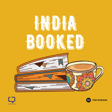
India Booked | The Climate Story
In this episode of India Booked, host Ayushi Mona talks to Rajat Chaudhuri about 'The Butterfly Effect', on how his work as a climate activist is reflected in his fiction, the necessity of "enveloping scientific ideas in a story" to make it more accessible, the interconnected roles of technology, politics, public health and the environment, especially in India, and more. Listen in for a scathing yet succint breakdown of how consumption and corporate lobbies work, and the role activism can play in correcting injustice. The Butterfly Effect reveals a grim picture of humanity, it brings to life an eco-dystopian story revolving around the threats of technology and genetically modified crops. It goes on to show the disastrous circumstances that may befall humanity when scientific experiments go horribly wrong. Humans are thus pushed into a bottomless pit of dystopia and dejection; and with the theme of a pandemic running through the narrative, it is a timely adventure story to watch out for.
It simultaneously addresses classism, capitalism, extreme poverty and inequity, as well as the rise of autocracy (none of which is unimaginable or restricted to the pages today).
